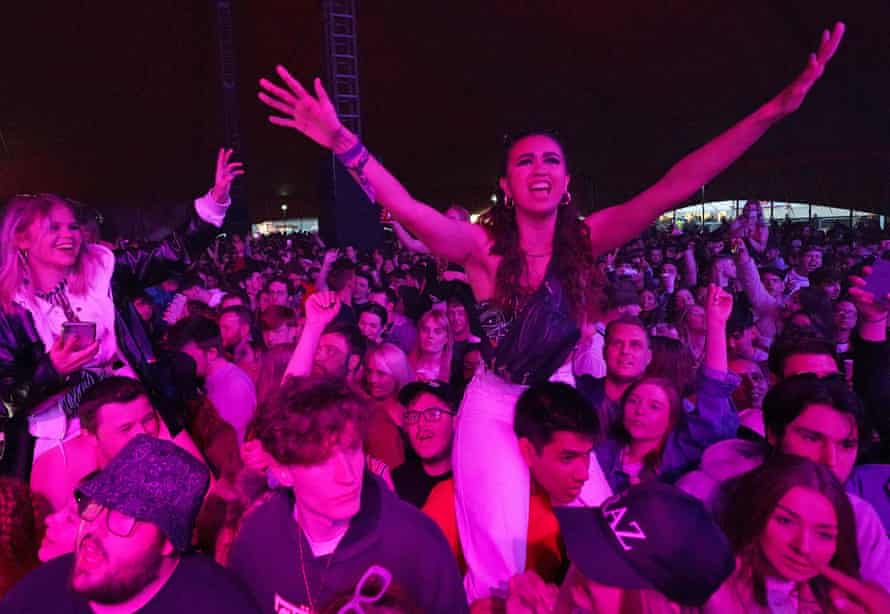The first “near-normal” concert since Covid began took place in Liverpool on Sunday, with 5,000 giddy music lovers crowding into a festival tent with no masks and no social distancing.
All had agreed to act as guinea pigs for scientists studying the safety of mass events as part of the government’s Event Research Programme. A negative Covid test was a condition of entry, with concert goers asked to take a further PCR test on Friday “so that festivals can go ahead this summer”.
Stockport guitar band Blossoms were headlining the show at Sefton Park, which felt like a euphoric mini-festival. There were bars selling overpriced pints of Strongbow in paper cups, huge queues for progressively grubby Portaloos and extremely excited young people scarcely able to believe their luck at being out of the house in big groups without being told off by the “rule of six” police.

“We are ecstatic!” said Tom Plummer, 19, a chemistry student who was wearing matching Hawaiian shirts with his housemates. “I will happily be a test subject for Boris [Johnson] any day.”
Inside the tent messages flashed up on screens ordering revellers to “BE KIND: if someone wants a bit of space, give them room.” Another said: “It’s fine to wear a face mask in the big top if you want to.”
Pretty much nobody did. They were too busy enjoying the novelty of having their chin – or lipstick – on display in a crowd for the first time in what has felt like an age. There was a lot of hugging, much shrieking and selfie-taking to document this evening of – dare we say it? – post-pandemic history.
Everybody was so happy to be out (out!) that the support bands were hailed like megastars. “One step for scousers …” began Liverpudlian singer-song writer Zuzu as she opened to massive applause. “Oh my God, look at youse, I’m going to cry.”
It was an emotional night. By the time Blossoms took to the stage, straight boys in bucket hats were giving each other big sloppy kisses and girls in bikinis were swaying on their boyfriends’ shoulders.
Singer Tom Ogden promised “the best night you’ve had for a very, very long time”. A low bar, perhaps, but true all the same: a sweaty, joyous, raucous evening of pressing up against strangers all singing the same tune.
Many concert goers were first-year students at Liverpool’s universities, most of whom had caught Covid in freshers’ week and felt cheated out of university life.
“I’ve still never been to a club, ever,” said Jade Webber, 19, studying physiotherapy. She was extremely excited to be at the gig and had spent the previous fortnight learning all the lyrics of all three bands on the bill, to get the most out of the experience. As well as Zuzu and Blossoms, the lineup also featured Wigan four-piece the Lathums.
Tim West, 19, studying veterinary science, said lockdown had been tough on young people, who are least at risk of getting seriously ill and at the back of the vaccine queue. “Is lockdown worth killing everybody’s enjoyment?” he asked.
It was Blossoms’ first gig since 15 March 2020, eight days before Boris Johnson put the UK into a then unprecedented lockdown.
The five-piece thought they might be out of action a few months. Their accountant worked out they could spend 18 months off the road before they would have to get other jobs, but they quietly hoped to at least be able to hit the festival circuit to tour their number one album, Foolish Loving Spaces.

In the end it was over a year since they took to the stage again for what the band described as “a massive honour”.
Ticket holders had to be over 18 and registered with a GP in the Liverpool city region to attend. Contractors from outside the area, including journalists, had to take live Covid tests on Zoom on Saturday in order to gain accreditation.
The concert was the biggest seen in the UK since Covid hit last March and part of a series of pilots including club nights, football matches and snooker tournaments.
Closing the night in front of five thousand smiling faces, Ogden summed up the moment. “It had been devastating year,” he said, “but this has been a colossal ray of sunshine.”
This content first appear on the guardian
